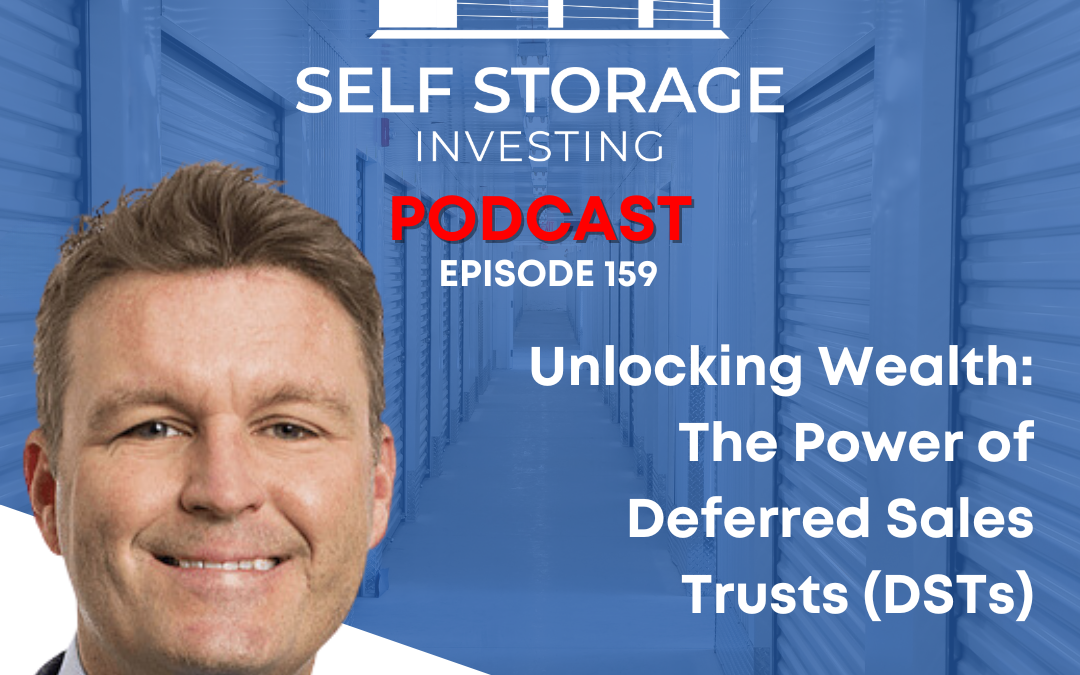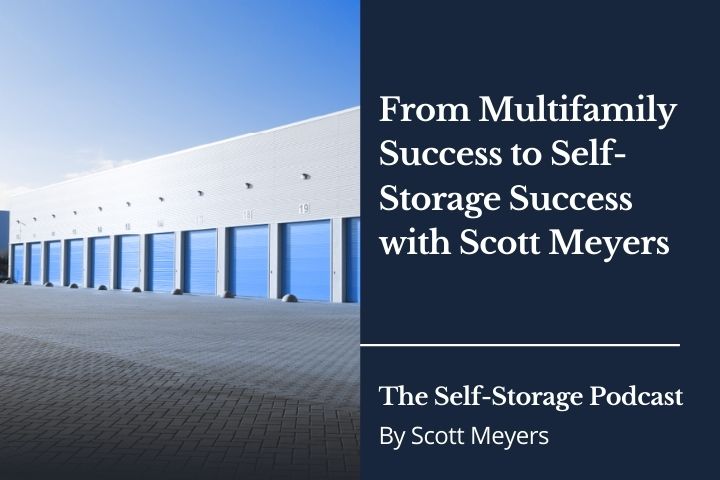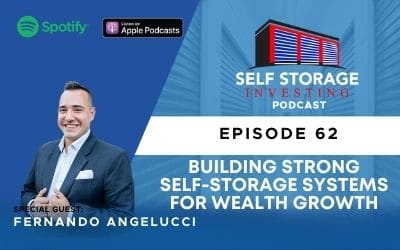In this episode, Scott is joined by Frank Hanna, a real estate investor and financial advisor, who delves into the intricacies of Delaware Statutory Trusts and their tax advantages.
With a background in the restaurant and hospitality industry, Frank transitioned into real estate, amassing a diverse portfolio. Today, he focuses on the specific benefits of Delaware Statutory Trusts, explaining how they serve as a strategic tool for real estate investors. Frank discusses the importance of understanding these trusts, their role in tax efficiency, and how they can enhance an investor’s portfolio.
He emphasizes the need for thorough research and working with experienced professionals to leverage these trusts effectively.
LISTEN FOR
4:05 The Benefits of Delaware Statutory Trusts (DST) in Real Estate Investing
6:35 1031 Exchange Process with DSTs
10:19 Tax Benefits and Investment Options
18:57 The Resilience and Attractiveness of Self-Storage Investments
Leave a positive rating for this podcast with one click
GUEST: FRANK HANNA
Frank B. Hanna Jr, is a leading specialist in estate planning, business succession planning, and wealth management for a select group of individuals, executives, and privately held business owners.
CONNECT WITH GUEST FRANK HANNA
Website | Facebook | LinkedIn | Instagram
CONNECT WITH US
Website | You Tube | Facebook | X | LinkedIn | Instagram
Episode Transcript
Frank Hanna (00:00):
I learned a lot of good lessons there, but ultimately decided that I wanted to do something else with my life.
Announcer (00:14):
This is the Self Storage Podcast where we share the knowledge and skills from the industry’s leading investors, developers, and operators to help you launch and grow your Self storage business. Your host, Scott Meyers, over the past 18 years has acquired, developed, converted and syndicated nearly 5 million square feet of Self storage nationwide with the help of his incredible team at Selfstorageinvesting.com, who has helped thousands of people achieve greatness in Self storage.
Scott Meyers (00:49):
Hello everyone, and welcome back to the South Storage Podcast. I’m your host, Scott Meyers, and on today’s episode we have Mr. Frank Hanna, who has achieved a fair amount of success in a number of different areas of real estate. We come from similar backgrounds, even though our paths are just a little bit different, and it’s the manner in which he invests in real estate is the reason that I wanted to have him on the show because again, very similar to what we do, but different markets, a little bit of a different path, but I think you can enjoy what we have to say. So Frank, welcome to the show.
Frank Hanna (01:20):
Thanks for having me, Scott. Excited to be here.
Scott Meyers (01:23):
I am as well as we were talking off camera, I’m really excited to share with Storage Nation a little bit about your story, your journey, and your path, and a couple other areas that we’re going to dive deep into. So with that, would you share a little bit about your background and how you got to the place? Well, how you got started in real estate to begin with and to the place where you are right now.
Frank Hanna (01:43):
Yeah, so I grew up in the kind of restaurant hospitality business, so mostly restaurants, a little bit of hotel boutique operations and was doing more of day-to-Day operations there instead of handling the overall real estate management, learned a lot of good lessons there, but ultimately decided that I wanted to do something else with my life, and we had a small real estate portfolio at that point in time, which was at the beginning, single family homes that we were building and flipping. And then we kind of expanded on that and built a pretty nice residential multifamily portfolio that we ultimately got tired of the day-to-Day headaches that came with that and started just doing tax-free 10 31 exchanges with some of those assets and slowly expanded and diversified our portfolio into self storage, triple net lease, single tenant, big name tenants, still do a lot of multifamily and a variety of different asset classes around the same time as that was kind of taking off, we kind of identified a void in the marketplace for I’d say comprehensive financial guidance.
(03:03):
So I’m a financial advisor by trade, so while we were kind of building our real estate portfolio, we were also getting pretty well-versed and packaging some pretty, I’d say strong resources to help people with estate tax trust, traditional investment planning. So we truly consider ourselves independent and agnostic financial advisors, but we also now package a lot of sophisticated real estate deals in syndications and offer them to the smaller investor that either doesn’t want to deal with the day-to-day management of those assets, or maybe they want to invest in real estate and they just don’t know where to start.
Scott Meyers (03:53):
So what does that look like, Frank? Are you looking at a fund of a fund model or are you just truly bringing them along with you, or are you truly just showing people different ways that they can invest in syndications?
Frank Hanna (04:05):
So I would say we’re kind of educating them on the benefits of pulling their money together to get access to a higher scale, more institutional type of deal. And then there’s typically a strategy or a storyline with our deals. So I’d say a variety of our deals. We utilize a concept called a Delaware statutory trust, which is essentially a pre-packaged, passive investment real estate option that qualifies for a 10 31 exchange. So we get a lot of investors that come to us strictly for looking for a 10 31 exchange, maybe they can’t find the replacement property they need, or again, maybe they’re tired of the headaches of managing that property, so they’ll invest in that type of deal. We’ll have other deals that are really tax driven in the sense of accelerated depreciation. So we’ll package a few deals for real estate investors that are professionals or maybe they have enough passive income where they’re looking for some tax deductions. So we’ll have deals that people are looking for that accelerated depreciation in the first year or first couple years. And then we have a lot of syndicated deals that are just have a good storyline behind them and we’re looking for some attractive tax, favored predictable mailbox money type deals. So I’d say those are kind of the three storylines that we operate, and we’re pretty balanced through those different opportunities.
Scott Meyers (05:43):
So let’s talk through what are those scenarios. We have also a number of investors that have either invested with us in the past, they’re coming out of a project, they got some gains or they’ve got another business, another real estate transaction or project they were involved in that they cashed out of. They got some money, 10 31 money available, however, they may not be able to find or want to do their own. And so grouping or coming together with a group of folks, A DST is an option for doing that obviously. So let’s first talk about the intricacies of that, or I should say how they go about doing it. And then I wanted to take a deep dive into how we get the depreciation for either that project or others, how we were able to package or what types of projects that you’re looking to bring people into so that they can maximize their deductions and say the first year or the first three anyway.
Frank Hanna (06:35):
So as far as the 10 31 exchange, if you decide to invest in A DST or a Delaware statutory trust, you still follow the same guidelines. So you need to connect with a qualified intermediary prior to settlement, get them the information they need, sign a contract. It’s typically a minimal cost, and they typically set up an insured escrow account that takes possession of the funds, so that’s what needs to be done prior to settlement. And then at settlement, there’s a clock that starts ticking 45 days to identify a property or A DST or a combination of both to invest in and the total of 180 days to reinvest those dollars. So with the DST, again, sometimes it’s a first choice, sometimes it’s a complimentary option to cover some taxable boot if you can’t make the numbers match up, or sometimes it’s just a backup plan if your hard real estate deal falls apart.
(07:34):
But the same information that you typically would have to provide the qualified intermediary in terms of pretty specific details on the property or the DST properties are what’s required to put on that identification sheet and then sign that. A lot of times we’ll step in and help the investor kind of fill that sheet out for the qualified intermediary. And then on the DST side of things, we’ve done our due diligence with the partners that we’ve put into place. So the DST may be available today, we’ve been working on it or reviewing it for six to 12 months to make sure it passes our criteria and guidelines where we think it’s got a real high probability of success so that dsst is ready to go. At any given time, we probably have 15 plus deals available in a variety of different asset classes, self storage, multifamily student housing, triple net lease, industrial, you name it. And we can walk through advantages and disadvantages of each deal. We list the deals we can turn around, we can settle, and three to five business days. There’s no closing cost on the DST side of things. And I’d say it’s pretty clean and easy, but it’s the right fit for certain investors and it’s not the right fit for others.
Scott Meyers (08:56):
So where do you fit then inside of the equity or the ownership piece of these deals? You’ve got a number of folks coming in to these projects wanting to invest for the various reasons you mentioned, and then you’ve got, it sounds like a number of other syndicators out there. So are you on the GP level with some of these folks or where do you fit in
Frank Hanna (09:15):
Specifically or the investors
Scott Meyers (09:17):
You specifically?
Frank Hanna (09:18):
I’d say both. Most times we’re a limited partner. We’re investing alongside with our clients that are investing in the deal. So we have a truly passive investment role. We don’t control any of the management, we don’t control the decisions, and we just get a proportion share based on the equity that we offer or choose to invest. But we invest in almost all our deals because we think it’s important to have our interests aligned with our clients. Sometimes we do play a GP role if we’re on the ground floor of an investment deal, sometimes we’ll step in and play a primary role in that investment strategy. But I’d say more times than not, we’re a limited partner alongside the investor. And then based on the total capital raise, whatever we or the investors choose to invest is your proportionate ownership in that deal.
Scott Meyers (10:19):
Okay. So now let’s touch on some of the tax benefits. In some of our projects that we syndicate or even within our fund, we will set up classes of shares. So the folks that are coming in with cash that truly could benefit from the depreciation versus those that are using, say a self-directed vehicle, we will bifurcate the share so that all of the depreciation will go towards those folks that really need it. How are you setting up your funds or the investments? Some folks that are coming in in that same situation, similar fashion, different or
Frank Hanna (10:49):
Yeah, very similar fashion. Yeah, and you can invest cash in A DST or some of these other funds obviously, but yeah, you get to participate in all the benefits that you get with real estate. So you get to participate in depreciation. We can write off deductions for amortization if there’s loans associated with the property, if there’s a value add component and there’s dollars being reinvested, that can offset some income for the investors. But typically if you come in with a cash investor, you can get some pretty substantial depreciation deductions. If it’s a 10 31 investor, we’ve got a factor in there kind of carryover basis and it’s typically not as impactful, but it could still be effective.
Scott Meyers (11:37):
Well, Frank, without sharing the recipe to your secret sauce, there’s some folks out there that are listening and probably thinking, well, wait a second. Now it looks like Frank, he’s an advisor, so he’s got the chops, he’s got the experience, and he’s got the schooling behind him, the education behind him to be able to advise people. So people are coming to him or he is built, say a database, or at the very least a tribe group of friends that know and trust him. And so now he’s gone out to the marketplace and whether these are deals that he has on his own or he finds other syndicators and matches him up and then inserts himself into the projects on the LP or GP side, I think I want to do more of that. Frank, tell me how I go about building a business like that or going down the path of being able to be like Frank. So I
Frank Hanna (12:24):
Think it comes down to aligning yourself or surrounding yourself with like-minded individuals and people that could potentially mentor you. I’m always looking for people that I can learn from. Again, I think our story’s a little bit unique because we’re postured right in the middle of traditional financial investment opportunities, stocks, bonds, index funds, that type of stuff. But we also have a real estate side of things, and we’re always looking for new opportunities, new partners. So there’s zero acts to grind with what we are advising the clients on. We want to give them a wide menu of choices, walkthrough again, those advantages, disadvantages, and then let them select what’s right for them. So Scott, I followed you guys and you guys do some nice things, and there’s probably some opportunities we might be able to assist with, participate in potentially. But we look at ourselves as we spent a lot of time and money and energy over the last 10, 15 years kind of building a platform where we invest and we’ve kind got several layers of protection, due diligence.
(13:41):
Nothing in life is risk free. But once we kind of go through and we underwrite a lot of these deals and say, Hey, you know what? This is pretty conservative. Let’s look at worst case scenarios and let’s put something where preservation of principles first, and can we reliably count on this deal to meet our goals and objectives? So we feel like we’ve done a lot of the heavy lifting on those deals, and then it’s a matter of trust. So we’re meeting individuals who will give us a shot, either they’re meeting us for the first time or they know other investors that have had successful deals with us. And then it’s just about following through with our promise.
Scott Meyers (14:27):
Well, storage Nation, the secret sauce is just what Frank mentioned, and if you didn’t catch it, I’ll just summarize it. He’s been in business for a number of years. He’s got a number of folks that he’s invested with that he’s performed for and performed with, and they know and trust him. And as the African proverb says, if you want to go fast, go alone. If you want to go far, you go together. And so leveraging through his platform, the people that have come alongside of him that he’s done well by and that they have done well with Frank allows him and enables him to be able to continue to move forward with other folks and to get involved in more deals. And Frank, I think you would probably agree with me, and that the older we get, the wiser we get, the more experienced we are in this industry.
(15:14):
To me, life seems too short to try to continue to go off with testing new relationships in many instances. I mean, we’re always adding to folks that we invest alongside, but in terms of folks that we invest with or in, that pool continues to get smaller, and that’s because some folks go by the wayside. And I think there’s a lot of merit in folks of being able to follow you because of your track record, your history, but then also more importantly, your relationships of the syndicators of the folks that are the jockeys that are running these deals. Would you say that’s true? Yeah,
Frank Hanna (15:44):
Absolutely. I think, again, we’re not perfect. We’ve learned the hard way in the past on deals. And again, we’ve built strong relationships that we trust and we believe in and have financial scale and a really strong track record. So we feel like through us doing the litmus test on a lot of the different companies we’ve partnered with over the years, we’ve got a best of both worlds, our best in class portfolio of different options for new investors to look at.
Scott Meyers (16:25):
Okay, well, so there’s a lot of options out there. And you could also argue that there are fewer options out there because I think in many cases, the good syndicators have always been around, but the folks that haven’t been around for very long, well, they’re packing up and going home, or they’re waiting until times are good because they don’t know what to do in this environment or in this economic climate that we find ourselves in right now. So for yourself and for your investors, Frank, how do you go about vetting these folks? How do you reduce the risk when you’re looking at beginning to work with a new syndicator, another promoter or a new developer in an asset class that you’re testing out? Well,
Frank Hanna (17:06):
We cross reference with a lot of other people that we’ve worked with. We meet with their management teams. We look at every deal uniquely in itself. We never rubber stamp a deal based on a relationship, but we do everything from the full blown financial underwriting, environmental testing. We go visit with the management, we talk to the people on the streets that are managing the deal. We do a lot of demographic studies to really say, Hey, is this storyline important? And I’d say the markets that we work in are typically pro-growth, pro-business tax, favored states. So I think that’s important. So we know the markets that we’re in intimately, well, I’d say we do a lot in the kind of Sunbelt region, I’d say everywhere from Texas, Florida, Charleston, Nashville, Richmond, Charlotte, Georgia, a little bit in Arizona. But we’re staying away from some of those states that are really difficult to navigate and deliver. So we’ve kind of found the markets that we know the key decision makers, and we know the markets well, and people are moving to those states. And I think that’s a big driver on success, right?
Scott Meyers (18:29):
Yeah. The sunshine states or the smile states as we call ’em, the states that if you visit or live there, you smile because of nice and warm and they’re near water. And that’s been our focus as well. And so now let’s talk about, so you’re investing in a number of different asset classes, Frank, and this is the Self-Storage App podcast. So tell me what you like about self-storage and what your holdings and your experiences look like in investing in this asset class.
Frank Hanna (18:57):
So we’ve done a variety of different self-storage deals, many of which are in those markets. Self-storage, I think is a really sticky, resilient asset class. If you can find the right opportunity in the right market, in our experience, if you can scale it and you know how to manage it the right way, again, it it’s a asset class that performs well in good and bad environment. I think it’s good to kind of look back over the last 5, 6, 7 years and when economy was booming, maybe pre covid yet everybody buying the fancy toys and upskilling their houses and had the need for storage. And then things are uncertain right now. Hopefully it doesn’t get much worse, but once you accumulate all those items, even though you might downsize, retire, consolidate, you’re not going to get rid of all the things that you’ve accumulated over the years. So it’s been an asset class that we’ve done well in. A lot of times we’ll partner and maybe package a student housing deal and a self storage deal that are in close proximity. And when it’s your children and they’re doing what they need to do, oftentimes the parents have to step in and help facilitate that. So we’ve had some good successes where we’ve kind of packaged two assets close by to each other, and that’s worked out well.
Scott Meyers (20:30):
Good. Well, as we wind down here, Frank, let’s take a little side trip. Let’s take a little detour. Tell me about the best investment in real estate that you’ve ever made.
Frank Hanna (20:46):
I think we bought some waterfront dirt that was in the Fenwick Island, Delaware space. And at the time I was actually a kid, so I’ll say I was riding along shotgun, but it was my father’s move. But we bought a piece of raw land that was north of Ocean City, Maryland, and there’s drones. It’s not so much drone footage, probably helicopter footage of how barren and how far away this was from the middle of nowhere, but it was waterfront. And ultimately, if anybody’s familiar with Ocean City, Maryland and Delaware beaches at this point in time, that piece of land that we paid relative peanuts for is now worth tens of millions. But I remember the stories of how many people ridiculed hymn for buying this piece of land in the middle of nowhere. It was going to be a lost cause. And that was probably our biggest home run from a risk standpoint, real estate investment.
Scott Meyers (21:58):
What else? What are the lessons that you pull down from dear old dad over the years that has served you well along the path?
Frank Hanna (22:05):
Yeah, I think just playing for a rainy day. I learned a lot working for him. And ultimately, family businesses are tough and we were on the verge of killing each other, but so I’ve walked away from the family business. But yeah, just staying conservative, planning for a rainy day, keeping money on the sidelines, diversification, all those different things that I think people hear, but and keep your dollars working for. You don’t get so conservative that you’re not continuing to make those dollars work. And my goal has always been to try to get my passive income to exceed my active income. And I think once you get to that point, you really have financial freedom.
Scott Meyers (22:53):
Yeah. Well, it’s good back to the basics. And it isn’t always a sexy to hear those, the good foundational financial principles that you put in place to not only ensure your security and survival, but come to find out that’s the key to success as well and being ultra successful as well. Because if you don’t stay in business, then you can’t be successful and take advantage of markets like what we’re in right now. Now is the time when this is where millionaires and billionaires are created, which are the toughest of times for some folks who just weren’t prepared and weren’t able to take advantage of the opportunities that we’re seeing in the marketplace right now.
Frank Hanna (23:29):
Absolutely.
Scott Meyers (23:32):
Well, so what is, if I could ask Frank, and you don’t have to share this or you don’t have to share it in first person, but what is the greatest lesson perhaps you’ve learned in real estate over the years?
Frank Hanna (23:45):
I would just say do your homework, whether it’s real estate or sales in general, there’s a lot of good salesmen out there. And I think when we first got into it, we were quick to trust and take things for granted. And I always say, yeah, never ever assume. So do your homework. And even though somebody tells you something or how things are going to work out, absolutely, you’ve got to do your own digging. And we felt that several times early on when we got into deals and we got excited with a fast talker and assumed something was going to be a certain way and ultimately found out that it wasn’t posture or pitched accurately to us and it hurt us. So now we check and double check and triple check every little thing. And I think, again, we rarely ever make the same mistake twice. And I think it’s put us in good position where some of the pain and scars that we’ve suffered over the years, other investors that aren’t as seasoned, can avoid by partnering with somebody like us.
Scott Meyers (25:00):
Yep, a hundred percent. There is a no substitute for due diligence, and if you haven’t been to war and you don’t have the scar tissue or a lip, getting into a market that we’re in right now isn’t for the faint. And so absolutely sound advice that you should be looking for and to partner with somebody who has had that experience that you can draw a lean on, because folks like us, like you and I, Frank, we can see a little further down the road. And there’s merit in that without a doubt. Well, Frank, I want to appreciate you, Frank. I appreciate your time and spending out time with us and sharing your journey with Storage Nation, if you would. First of all, what is the best way for people to be able to get in touch with you and or follow what you’re doing?
Frank Hanna (25:40):
Yeah, if you guys would like to get in any more information, happy to discuss. We’ve got some really attractive opportunities, some really tax favored strong income streams. We’ve got some tax deductible deals that are available. There’s never a better time to take a look at our opportunities. And happy to discuss with anyone that’s out there. I would suggest going to our website, www.avxwealth.com. You could fill out a form or an inquiry, and we’ll contact you as soon as possible.
Scott Meyers (26:11):
Fantastic, Frank. Now one last thing before we end for today. What is a book that you have read that has had probably the most impact on you or maybe a book that you’ve gifted to people more than any other book?
Frank Hanna (26:24):
I would say of late, I’ve been reading a lot of Grant Cardone, like 10 X Real Estate. I’ve kind of gotten hot on some of the things in terms like a marketing standpoint and really doing some things that are outside my comfort zone. So I’ve read probably four or five Grant Cardone books in a row, and I’d say a year or two ago, I thought he was a lot of fluff, but there is a lot of truth to what he’s doing.
Scott Meyers (26:56):
Well, storage Nation, you have been spending time with Mr. Frank, Hannah, and as I said, our stories are very similar. Our paths are almost identical, Frank going out into different asset classes, but also doing the same things that we’ve been doing, which is looking for opportunities, bringing along our tribe, folks that know Lake and trust us, getting involved in deals that make sense across the landscape and taking along our folks with us as well, and all doing it all in a tax favorable manner. And also, Fran, I have not necessarily Grant Cardone, but this year I began reading different books, one being out called Amped Up, which is really just, I guess maybe the place that Grant operates from, which is amped up and just increasing my speed and having, I dunno, increasing the sense of urgency in my own business and just to make sure that I’m firing on all cylinders this year. Yeah,
Frank Hanna (27:46):
No, I love it. I agree with it.
Scott Meyers (27:50):
Alright, well Storage edition. You’ve been spending time with myself and Frank. Frank, I appreciate you so much. Thanks so much for your time and for the rest of you, we will catch you all on the flip side.
Announcer (28:04):
Hey gang, wait three things before you leave. First, don’t forget to follow the Self Storage Podcast and turn on your notification so you never miss another episode. And while you’re there, please leave us a five star review if you like the show. Second, be sure to share your favorite episodes and more via Instagram and don’t forget to tag us. And lastly, head to the links in the show description and hit follow on Twitter and Facebook to get a front row seat as we grow and scale our business and bring you along with us.
















